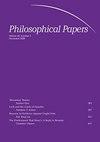Obligation Incompatibilism and Blameworthiness
IF 1.3
3区 哲学
0 PHILOSOPHY
引用次数: 0
Abstract
Abstract Obligation incompatibilism is the view that determinism precludes moral obligation. I argue for the following. (i) Two principles, ‘ought’ implies ‘can’ and ‘ought not’ is equivalent to ‘impermissible’, generate a powerful argument for obligation incompatibilism. (ii) Assuming conceptual ties between blameworthiness and impermissibility or belief in impermissibility, these principles also imperil blameworthiness provided determinism is true. If determinism undermines blameworthiness, it also undermines proposed justifications of punishment that presuppose blameworthiness. Allegedly blameworthiness-free justifications of punishment fare no better given their moral presuppositions. (iii) The most promising compatibilist reply to the argument for obligation incompatibilism should concede that obligation requires alternatives but of a variety that one can have even if determinism is true.义务不相容与罪责
抽象义务不相容论是决定论排除道德义务的观点。我主张以下几点。(i) 两个原则,“应该”意味着“可以”,“不应该”等同于“不允许”,为义务不相容性提供了有力的论据。(ii)假设应受谴责性和不允许性之间存在概念联系,或者相信不允许性,只要决定论成立,这些原则也会危及应受谴责性。如果决定论破坏了应受谴责性,那么它也破坏了以应受谴责性为前提提出的惩罚理由。考虑到他们的道德预设,所谓的免责惩罚理由也没有什么好处。(iii)对于义务不相容论的论点,最有希望的相容主义者的答复应该承认,义务需要各种选择,但即使决定论是真的,也可以有各种选择。
本文章由计算机程序翻译,如有差异,请以英文原文为准。
求助全文
约1分钟内获得全文
求助全文
来源期刊

Philosophical Papers
PHILOSOPHY-
CiteScore
2.10
自引率
0.00%
发文量
18
期刊介绍:
Philosophical Papers is an international, generalist journal of philosophy edited in South Africa Original Articles: Articles appearing in regular issues are original, high-quality, and stand-alone, and are written for the general professional philosopher. Submissions are welcome in any area of philosophy and undergo a process of peer review based on initial editor screening and refereeing by (usually) two referees. Special Issues: Topic-based special issues are comprised of both invited and submitted papers selected by guest editors. Recent special issues have included ''Philosophy''s Therapeutic Potential'' (2014, editor Dylan Futter); ''Aging and the Elderly'' (2012, editors Tom Martin and Samantha Vice); ''The Problem of the Criterion'' (2011, editor Mark Nelson); ''Retributive Emotions'' (2010, editor Lucy Allais); ‘Rape and its Meaning/s’ (2009, editor Louise du Toit). Calls for papers for upcoming special issues can be found here. Ideas for future special issues are welcome.
 求助内容:
求助内容: 应助结果提醒方式:
应助结果提醒方式:


